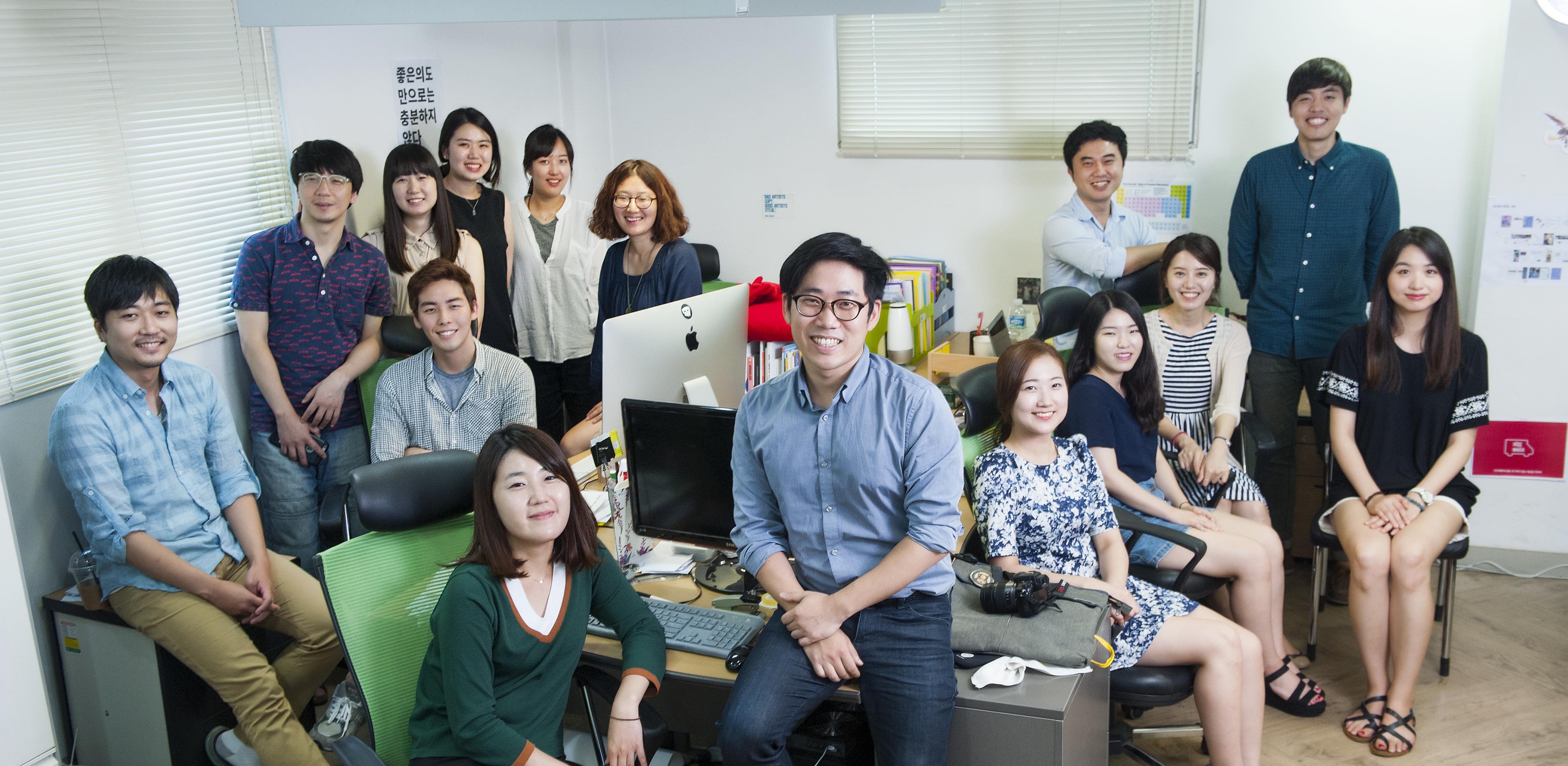The Inha Times interviewed Jason Cho, founder and owner of ‘Benefit Magazine’. According to Jason Cho, Benefit Magazine is a company that works for social renovation and helps people to perform more independently. They are actually doing a lot of special things for solving social problems.
|
 |
| Jason Cho, the owner of ‘Benefit Magazine’, and their editors |
The Inha Times (IT): Can you explain us the reason why you started this company?
Jason Cho: Fortunately, I got a job when I was in my junior year of university because I had a special certification that only 200 people have in Korea. So I had a lot of spare time. During that period, I was studying international trade and I saw that so much exists in terms of resources, knowledge, and technology, exists but that a lot of people are still suffering. At that time, I questioned what I could do for this society, and fair trade presented itself as an answer. So, I started this company to solve all kinds of social problems in the world and engage people in the concept of fair trade.
IT: You've just talked about the fair trade issues. What do you think are the largest difficulties with fair trade?
Jason Cho: There are many difficulties in our lives. You can look at the bigger picture or executive parts. And for the executive parts, the biggest problem is native people are not doing it. For example, the process of obtaining official fair trade status is too difficult, so many people who are producing coffee beans or sugar cane simply do not bother with fair trade. I think that this is the largest difficulty in the area of fair trade.
IT: Benefit Magazine uses online services such as twitter, Facebook, blogs, and its homepage. Is there any difficulty you experienced in using these services as a large company?
Jason Cho: The biggest difficulty that I had was with the content itself. As everybody knows, social renovation is not an interesting topic when compared to the content of Pikicast, Insight and others. I think that it is a limitation of media businesses. However, now, thankfully, we have achieved 1 million view each month on our Naver blog.
The difficult part of dealing with social renovation is if I wrote in jargon about specialised information, then no one would read. On the other hand, if I am too general in the information given, then it won’t affect people to a high enough degree. S finding a balance is most difficult part that I am facing right now.
IT: According to Benefit Magazine’s blog homepage, the focus should be on the ‘solution’ rather than the problem itself. Can you give an advice to university students who are planning their own start-up business in related to your ‘solution value’?
Jason Cho: A lot of people who try start-ups disappear in just 2-3 years. In my opinion, you don’t have to start with a large business model. For me, I started with only 16 people. Also, you don’t have to think that you can solve all of the problems of the world because just 1 or 2 impacts will change the world. I will say that all of our problems are solvable; we only fail to solve problems easily because we can’t see clearly.
IT: When people hear the term ‘social enterprise’ in relation to NGOs, they might think of ‘Public interests’ of services. So people might become confused with the purpose or definition of social enterprise. Can you explain the definition and your personal idea of it?
Jason Cho: There are a lot of social enterprises in our world. However, our company is an enterprise that aims to solve social problems and this is the purpose itself. To distinguish this part, there are corporate conscience award for companies that earn money but still act socially or environmentally responsible. However, my personal definition of social enterprises are those which solve social problems and earn money at the same time. This is totally different from the domestic definition.
IT: Nowadays, Benefit Magazine is focusing on its ‘Benefit Innovation Toolkit’. The main point of the ‘Benefit Innovation Toolkit’ is that everyone can help to solve social problems. Can you tell us what it is and the process of it?
Jason Cho: The Benefit Innovation Toolkit took 2 years to develop. During the process of development, we looked at 400 cases of social problems and discovered that they had a pattern. So if we follow the process of these problems, then we believed that we could find the solution. We made 160 cards including all the process of solving and accessing the problems, and with these cards, from eight grades to 70 year olds can make solutions to their own social problems. Now we are working with 45 groups, including universities, cities, and companies.
The purpose of the ‘Benefit Innovation Toolkit’ is to give a meaningful experience and sense of achievement. One way of giving a sense of achievement is by providing a lot of awards.
IT: In your personal opinion, what is the biggest social problem that we are facing now?
Jason Cho: In my opinion, the biggest social problem is that societies focus on money rather than the people. A lot of things in our life are automated and systemised for financial gain. For example, the direction of developing, using, and even the purpose of study is one of the biggest problems in the world. I think that society should focus on the value of humans rather than capital.
김지윤 jeeyoon0817@hanmail.net
<저작권자 © 인하프레스, 무단 전재 및 재배포 금지>

![[보도] 제43대 총학생회 후보자 공청회 개최돼](/news/photo/202404/11686_5015_2626.png) [보도] 제43대 총학생회 후보자 공청회 개최돼
[보도] 제43대 총학생회 후보자 공청회 개최돼
![[보도] 제43대 총학생회 후보자 공청회 개최돼](/news/thumbnail/202404/11686_5015_2626_v150.jpg)
![[보도] 총학생회장 선거 열려···학생사회 대표자는?](/news/thumbnail/202403/11668_5014_266_v150.jpg)
![[보도] 무전공·계열제 논의···학생은 어디에?](/news/thumbnail/202403/11666_5011_2238_v150.jpg)
![[보도] 인하 70돌, 다양한 행사 이어져](/news/thumbnail/202403/11663_5009_165_v150.jpg)
